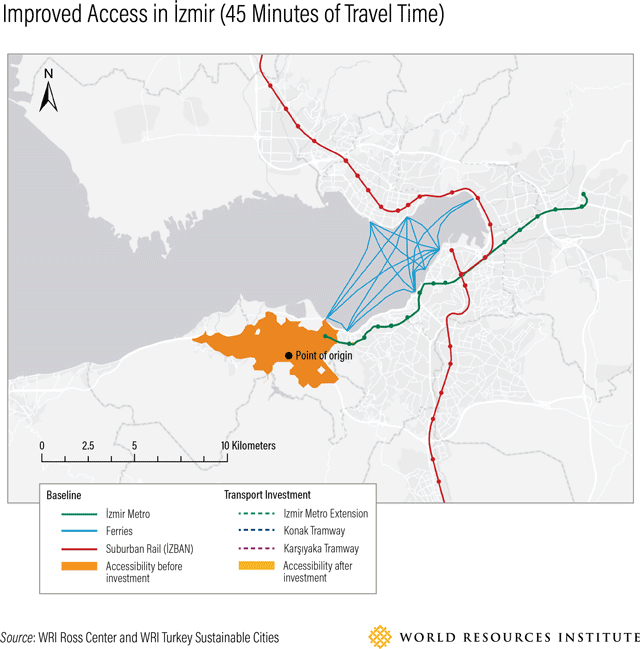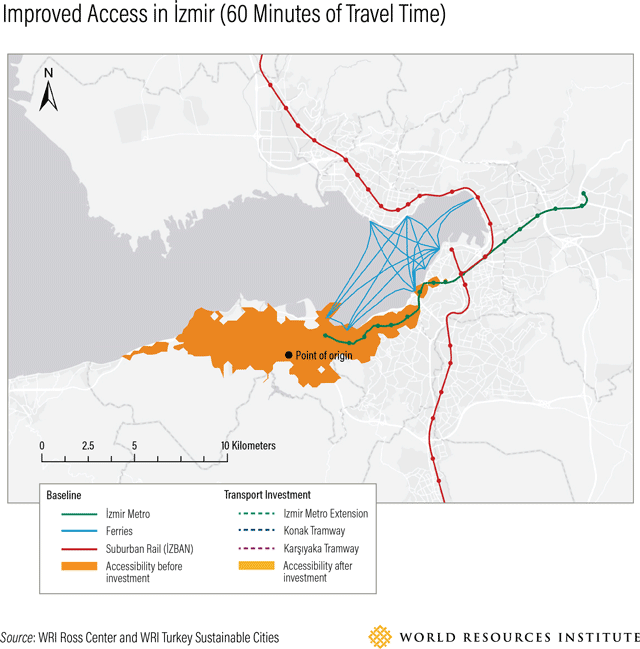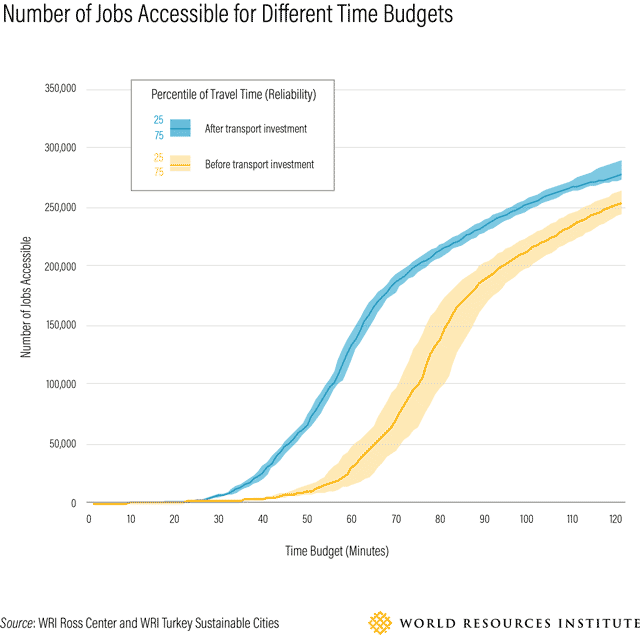
From a point of origin in the western part of the city, accessibility to jobs within 45 minutes of travel time improved substantially after transport investments in İzmir, Turkey.
The previous Map of the Month showed the power of accessibility data – comparing average travel time to different services in Mexico City – as a proxy to understand inequality in cities. But similar analyses can also help us to understand how infrastructure and service choices can change or have changed accessibility in a city. For example, WRI Ross Center looked at how changes in transport options have changed accessibility in İzmir, a city of approximately 4 million on the Aegean coast of Turkey.
In 2017, the International Finance Corporation wanted to assess the performance of recent transportation investments in İzmir, including its own. In response, WRI conducted an accessibility assessment of port improvements, new ferry boats, new tramway lines, and new metro cars and compared them to a scenario with no new investment. We carried out point-to-point analyses for specific neighborhoods, to discern different impacts for different areas. From a point of origin in the neighborhood of Balçova, for example, potential accessible jobs within an hour of travel across public transport modes increased from about 32,000 to 137,000. Citywide, the analysis found a 5% improvement in job access resulting from these transportation investments since 2010.

The number of jobs accessible from the same point expanded even more within 60 minutes of travel time.
We also assessed the impact of new investments on reliability of the service. Using the same point of origin, the chart below shows that the length and variability of travel times to job opportunities, represented by the narrower vertical width and higher sloping curve in the investment scenario as compared to the baseline scenario, declined. Service is now more reliable and reaches more opportunities in less time.

This type of analysis is getting easier. The concept of “access to opportunities” has existed since the 1950s, but the data-intensive nature of the measure made it difficult to put into practice. Advances in computation and data are now changing that. The establishment and spread of global data standards, specifically OpenStreetMap for road networks and General Transit Feed Specification (GTFS) for public transit, helps tremendously.
Still, a certain amount of legwork is still required in many places. In İzmir, the authors manually constructed GTFS routes for the major transport infrastructures based on available transit schedules and service levels. This was combined with available job data which provided the potential origins and destinations. These datasets were then used in the Conveyal Analysis tool to assess scenarios of changes in infrastructure and service.
While most cities provide data on their infrastructure investments, many do not have the data needed to assess the accessibility outcomes of those investments or do not make the data available to others. This is a mistake. Data itself should be considered critical infrastructure, alongside road and rail networks, a system the city can leverage to provide better services and make better decisions. Without such data infrastructure, accessibility and other advanced analyses are much more difficult.
The availability of accessibility indicators, and the outcomes-based approach that it enables, can shift the transportation conversation from a focus on mobility as a means (e.g., moving vehicles more quickly) toward focusing on access as an end (e.g., ensuring all people can access where jobs, schools, health care, etc. are located). As highlighted in the World Resources Report working paper, From Mobility to Access for All, this shift in framing can put a city on a path toward results that are more equitable and just.
Thet Hein Tun is a Transportation Research Analyst at WRI Ross Center for Sustainable Cities.
Robin King is Director of Knowledge Capture and Collaboration at WRI Ross Center for Sustainable Cities.
Meltem Bayraktar is the Urban Efficiency & Climate Manager for WRI Turkey for Sustainable Cities
Eric Mackres is the Data and Tools Manager for Urban Efficiency & Climate at WRI Ross Center for Sustainable Cities.






